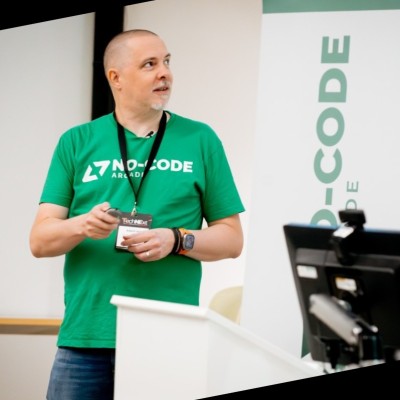To get the most out of No Code, Bristol needs a No Code Tech Cluster.

“We were working with a charity. They put out a technical specification. They were asking for software development in the Northeast,” said Adam Hill, head of No Code North East. “They got back five good quotes from software development companies. They quoted between £120,000 to £250,000. I mentioned No Code to the charity. They went off and did due diligence and then put a new specification to No Code firms. They ended up getting everything they asked for, for £40,000.
“But that work did not stay in the North East because we had no No Code developers here,” he said. “I decided that had to change.”
Adam Hill started No Code North East two years ago. Its HQ is in Sunderland. No Code North East’s mission is to spread the gospel of No Code amongst tech firms north of Manchester. If more firms use No Code, the North East tech sector will grow, said Adam. He has been enthusiastic about all things No Code for years.
“No Code blew me away. You can pay $10 or $20 for a subscription and use No Code to change software development. Tech start-ups can get started without having to remortgage the founder’s house. They could build a prototype that no one is even sure will work.

“No Code can put power into the hands of those who’ve never had before. We’re talking about democratising systems, functions, and software, “ he says.
Adam Hill surveyed local tech firms, asking them what kind of No Code event they’d like to see. Most people had no clue about No Code.
‘We learned people are not interested in No Code. What they’re interested in is what’s it’s going to do for them. We did not want to say ‘Come to a No Code event.’ Instead, we wanted to say, ‘Come find out how No Code can help your Startup or your business.’
Developing and testing a digital product can be expensive, said Adam. You can use No Code to build a ‘Minimum Viable Product’ at a low cost. Founders can build impressive-looking demos to show investors their ideas.
https://www.forbes.com/sites/forbestechcouncil/2021/09/24/a-ctos-perspective-on-no-code-mvps/
No Code can also help ambitious start-ups create a back office. At first, they may need a small and inexpensive set-up. As they gain market traction, they will need to add functionality on a just-in-time basis. A No Code system such as Agilebase can handle all that. Agilebase created a flexible back office system for South Wales firm CH Foods. It helped them grow into a firm with more than 200 employees.
No Code North East hosts one monthly meet-up and an in-person event annually. Could Bristol do something similar, to get its No Code cluster off the ground?
“If you want to start No Code Bristol you’ve got to be 100% transparent about what’s in it for you,” said Adam. “ If you think it will benefit Bristol, you must be clear. People will always assume the worst, whether you like it or not.
“We started off with a survey. We asked local firms, What do you want? What can we do for you? What can we do that you’re interested in? It helps putting things on that people are going to turn up to.”

As Adam started No Code North East in 2021, Oli Littlejohn launched No Code Scotland. It hosts monthly Edinburgh meetings in person.
“My advice is to start small,” said Oli. “It’s tempting to try and do bigger things like an extensive meetup with sponsors and event space. Or to add AV and guest speakers.
“I’m more of an IRL person when it comes to this stuff. If you’re going to do a regional thing, it is good to share a local cultural moment in a physical space. Go to the same pub, at the same time, once a month. Make it easy for people to know when it’s happening. Simple, consistent events. are the backbone of a community.
Creating something that lets members connect between events is important.
“It’s tempting to build an online community app, but simple is best,” said Oli. “Make sure everyone at your meet-up signs up to the same Whatsapp group or LinkedIn group.”
Business support organisations Techspark and SetSquared provide high-quality support to Bristol startups. Do we need another?
No Code can complement these business support services. It can boost businesses and shorten the time to success. But it can do much more than that.
“What I like about No Code is that it changes who gets to build,” says Oli. “That is big.”